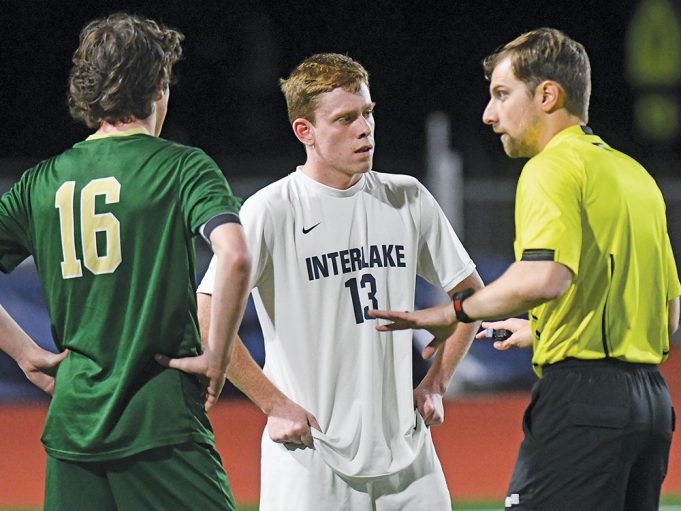If you have been an official for any length of time, you have had a game or more “get away from you.” Whether it was calling the game to allow players to play when they did not expect that, or some hidden, smoldering rivalry that erupted while it was your turn to moderate the game or just a bad situation in light, angles or partners, this is your moment to assert yourself and, by doing so, get that game back under control.
It sounds so easy when it is put that way — assert yourself and get the game back under control. The truth is far more complicated and it will take all of your skills and management expertise to turn this game around. The key to pulling this off depends on three things: understanding what went wrong, making amends to the affected parties and then changing your approach going forward.
What Went Wrong
In order to address the problem, you have to get a grip on what caused the game to get off the rails in the first place. Replay the comments from the players — was it a situation where you thought they wanted to play but the players really didn’t want that? Did you hear some trash talk that could have been stopped had you listened a little closer, and didn’t? Was it something else, like a significant injury or foul that was missed due to the natural interferences of 20 players moving in a space, combined with different angles of sunlight, a moment of inattention on your part or something elsewhere which you thought was more important at that point?
If you can put your finger on what the problem is, you are on your way to getting the game back under control. With that said, there are some cases where you should strongly consider terminating the game.
Hidden Bad Blood
If you are familiar with working in a particular area where you know the teams well, you may know of teams that have a rivalry. Then again, you may be helping an assigner on a new field and have no idea that the teams for some reason are mortal enemies. If a fight breaks out toward the end of any match, emotions will likely be at ragged edges. Restarting any match after a fight is likely to result in regrets, since the emotions that caused the fight are now even closer to the surface. Listen to the coaches and ask them if there is anything you need to know after clearing the offending players off the field. If there is a hint of bad blood, do the right thing and terminate the game. File the required report with the game authorities, sticking to facts only, and take this as a way to have avoided losing control a second time.
If you find yourself in a situation where that is not the case, now you have to address the hard part — making a reasonable apology to the team captains in a brief conference on the field. Start by pulling the referee team together and explaining to the team captains what you think is going on. “Look, I know number 3 just got his ankle broken –— and we didn’t see the play that led to it. That has to be frustrating and we apologize for that.” You can add in some more information, but don’t make excuses. The referee team missed it — own the mistake.
The following discussion describes what you could do after any particularly obnoxious foul or too many “ordinary” fouls in too short a period of time — whether or not there was an injury, noticed or unnoticed.
Take a moment to establish your going-forward plan. Tell the captains what you expect — no retaliation, good clean play. Explain that you are going to significantly change the way you are calling the game — that you will be calling it tighter and, if you see any issues, the cards will come promptly. Let them know also that, if the situation improves appreciably, you would be open to adjusting your game control appropriately. Ask the captains to brief their teams on the new expectations and give them a few moments to do so.
Recovering and Change
When you blow the whistle to restart the game, the entire referee team has to be on the same page. The ARs need to be particularly vigilant in watching for things behind your back. Call fouls quickly as you see them — the first few touches and fouls should help set the tone of the game, and show the captains and teams that you are going to keep your word. This is not the time to create “phantom” fouls, just to make a call. Run harder, stay closer to play, use your ARs and get the calls right. The players will quickly realize you have re-asserted control and this, in turn, will help to lower the game temperature. With this in mind, you have to maintain this level of control through the end of the game.
If the players sense the game going back to where it was, problems could quickly re-appear, and you will once again find yourself being challenged to maintain control as the game starts to re-escalate.
When you think about this, games get out of control because the referee team does not read the players or play well, or similarly, the referee team members are too predictable, and as a result the teams are reading them too well! If you are going to referee at a match with unknown teams, you need to use as many clues as possible to figure out an effective “starting level.” That can include arriving far enough ahead of time to be able to watch the teams arrive, warm up and practice, looking for the expected set pieces or actions that could cause problems during the game, as well as other concerns.
How you respond in such situations, either by assessing the situation and addressing it or not, makes the difference between a good official and just an official. Consider the above suggestions. Keep in mind that reading the game and players properly from the start is a far better way to keep the game under control. The hard way is, trying to recover a game after it has started to run away.
What's Your Call? Leave a Comment:
Note: This article is archival in nature. Rules, interpretations, mechanics, philosophies and other information may or may not be correct for the current year.
This article is the copyright of ©Referee Enterprises, Inc., and may not be republished in whole or in part online, in print or in any capacity without expressed written permission from Referee. The article is made available for educational use by individuals.


















